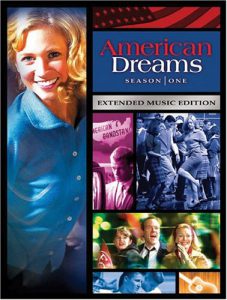I was shocked — pleasantly so — to find the first reference to “American Dreams” only five paragraphs into the Associated Press’ feature obituary on Dick Clark, who died on Wednesday at age 82.
Although I didn’t have strong feelings about Clark one way or another, one of the uber-host/producer’s quotes from a 1985 interview rings true (even if it is kind of arrogant): “There’s hardly any segment of the population that doesn’t see what I do.”
The Clark production I have the most affection for is the now-largely-forgotten primetime drama “American Dreams” (2002-05, NBC), which had a couple of Clark connections: For one, it came from Dick Clark Productions. For another, it takes place in 1960s Philadelphia, and two teen characters, Meg and Roxanne, are dancers on the Clark-hosted “American Bandstand.” “Dreams” used clips from “Bandstand” that show on the cameraman’s monitor peppered in with long-distance shots of a stand-in for the young Clark. It blended together seamlessly — with an appropriate dash of excited chaos — and made viewers feel like they had just stepped out of a time machine.
Older colleagues have told me that “Bandstand” wasn’t the consistent blast of music that the rose-tinted “Dreams” suggested. In reality, there were long stretches of talk between the singing and dancing. And although I don’t deny that Clark was professional and smooth at filling that time, it’s hard for a viewer to turn off their desire for music when watching a music show. Being born in 1978, I was much too late for “Bandstand’s” heyday (although the show’s entire run was from 1952 all the way until 1989), but I did grow up in the golden years of MTV and VH1. Those channels were notorious for having as many commercials as they had music videos. So I can relate to the wait.
But the padded “Bandstand” format meshes perfectly with “American Dreams,” because during the time when Clark rambles on — asking audience members to rate new songs, or whatever — the show cuts to Meg and Roxanne talking in the stands about key character and plot points even as they bop or sway. Then it smoothly segues back into the re-creation of a “Bandstand” music number. (When I heard about Clark’s death, I immediately sought out this YouTube clip of my all-time favorite “American Dreams” opening segment.) On “Dreams,” the music numbers were presented by modern artists playing the role of the vintage artists — for example, Michelle Branch as Lesley Gore, Third Eye Blind as The Kinks, and Hilary and Haylie Duff as the Shangri-Las.
Although I watched “American Dreams” pretty much from the beginning, I never ranked it in a year-end top 10. That’s partly because 2002-05 was a strong period for TV, but it’s also because it took me a few years to fully appreciate the series. Yes, those rose-colored glasses are factoring in again, but I rewatched Season 1 (the only season released on DVD, sadly) a couple years ago and the show is still good.

Today, I have to rank “American Dreams” as one of my most-missed shows. The earnestness and broadness that kept me from totally embracing it when it aired is now exactly the right tone. The performance by Sarah Ramos as little sis Patty Pryor is more impressive now that she has transformed herself into the more Meg-like Haddie on “Parenthood.” And with Brittany Snow’s career kind of stalling, it makes her breakthrough role as Meg more striking, and Meg’s series finale bus trip to who-knows-where more poignant. Throw in Gail O’Grady — an actress who’s been in some bad roles since — and I feel like “American Dreams” made good actors into great actors.
While underappreciated by me, it’s not as if “American Dreams” was completely overlooked during its time. The AP obituary claims:
While never a hit, the series was embraced by older viewers as a warm souvenir of the era that spawned Clark, and as an affectionate history lesson for their children and grandchildren.
Indeed, observers latched onto the parallel between Vietnam and Iraq as J.J. signed up for the Army, Jack staunchly supported his country, and Meg began to have doubts about the righteousness of the war. (In another parallel, Jack ran for office in Philly at the same time the 2004 presidential election heated up.) The last few years aren’t as defined by war as 2002-05, but the later economic problems led to the bank bailouts and a profound realization of the government’s power over our lives. When I think of “American Dreams” against this backdrop, it all ties together, because we again live in a time when many people have profoundly different values than the politicians in power.
“American Dreams” isn’t Clark’s most remembered contribution to TV (unfortunately “Super Bloopers and Practical Jokes” is probably better known), but I do think it’s his best show, and the one that will best stand the test of time.

